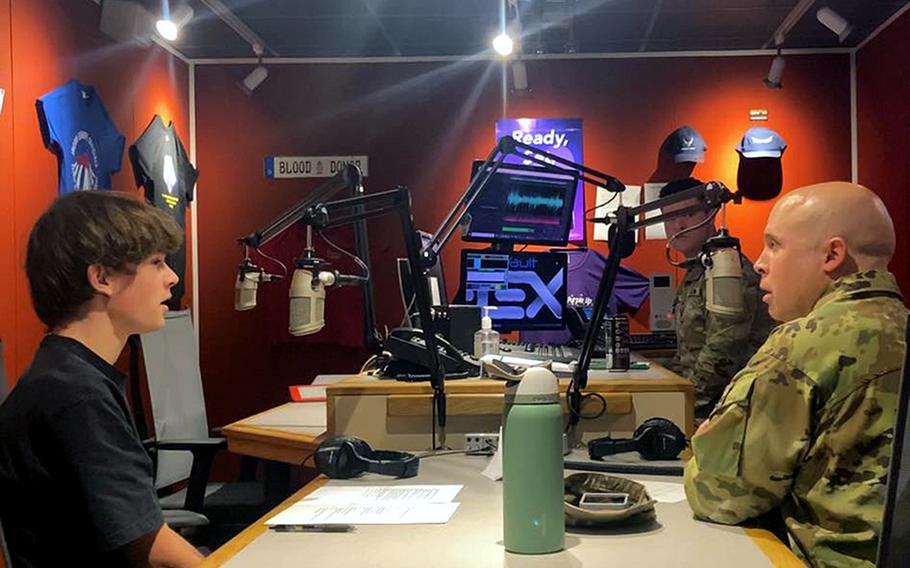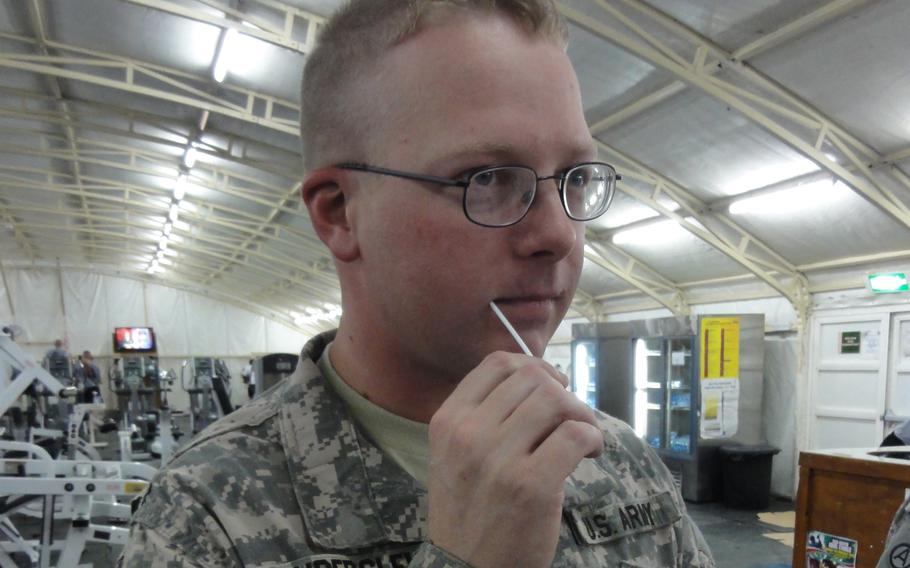
Cole Mitchell, a Ramstein High School junior, and Master Sgt. Brittin Davis, an Air Force first sergeant, discuss bone marrow donation drives they’ve organized this month in the Kaiserslautern Military Community while at the American Forces Network studio in Kaiserslautern, Germany, on Nov. 7, 2024. (Cole Mitchell)
Air Force Master Sgt. Brittin Davis has a lot to be thankful for this Thanksgiving.
Nine years ago, Davis, a first sergeant for the U.S. Air Forces in Europe – Air Forces Africa Warfare Center at Einsiedlerhof Air Station, was given a second chance at life.
A bone-marrow transplant on Thanksgiving Day in 2015 helped Davis beat a rare and aggressive blood cancer.
“Doctors always tell you, this is your new birthday, you’re replacing all of your blood cells,” he said.
Now Davis, with the help of an Eagle Scout candidate, is trying to help others fighting for their lives. Davis for the second consecutive year is heading up the Salute to Life bone marrow donor drive for the Kaiserslautern first sergeants council. Salute to Life is the bone marrow donor center for those affiliated with the Department of Defense, including the U.S. military.
Volunteers will be at registration tables throughout the day through Dec. 1 at the Ramstein and Vogelweh commissaries, the Kaiserslautern Military Community Center, and both fitness centers on Ramstein. Ramstein High School junior Cole Mitchell, for his Eagle Scout project, organized and enlisted the help of fellow scouts from Troop 156 for the KMCC registration drive on Saturday and Sunday.
With Mitchell’s help, Davis hopes to increase last year’s registration number of 450.
“This is directly saving lives if matches are made,” Mitchell said.
Davis was 26, working as a technical training instructor at Goodfellow Air Force Base in Texas and feeling otherwise healthy when he discovered a bump on his head. He had thought it was an ingrown hair.
It turned out to be something far less common and potentially deadly. Davis was diagnosed with blastic plasmacytoid dendritic cell neoplasm, or BPDCN, a rare, aggressive blood cancer with features of both lymphoma and leukemia, according to the Dana-Farber Cancer Institute.
Davis was told his chance of surviving was under 8%, he said.
After a successful stem cell replacement procedure, Davis had enough healthy bone marrow to be his own donor, he said, but he had an outside donor match to fall back on if it didn’t work.
Davis was fortunate. As a Caucasian the probability of finding a match was about 79%, he said. For Black Americans, the odds drop to 29%, according to national registry numbers.
“We want everyone to register, but there’s a huge need for diverse ethnic backgrounds,” he said.
A healthy donor with human leukocyte antigens (HLA) — genes that code for protein in the blood — that are a close match to the person needing the bone marrow transplant increases the chances for success, according to the Cleveland Clinic.

Army Sgt. Chris Vinderslev swabs the inside of his cheek to become registered as a donor in the National Marrow Donor Program Database. (U.S. Army)
Mitchell said it only takes a few minutes to get registered in a nationwide database of donors. The process includes signing a consent form, providing some health information and contact details, and providing a DNA sample from a cotton swab swipe between the cheek and gums. To register, one must have a DOD ID card, be between 18 and 60 years old and be disease-free.
The Transatlantic Council, serving U.S. scouts and their families in Europe, Africa, Central Asia and the Middle East, approved Mitchell’s project for Eagle Scout, the highest rank which only a small percentage of scouts obtain. The Red Cross in Landstuhl put Mitchell in touch with Davis. He helped Mitchell get the donor collection kits he needed and base authorization to set up a registration station, Mitchell said.
“The more people we get to register, the higher the chances to find folks a match that need it,” Davis said.